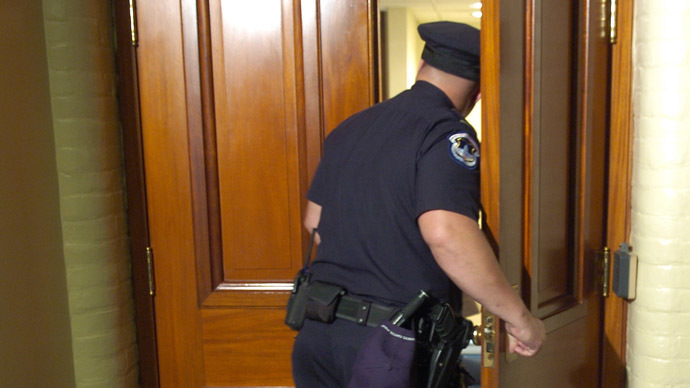Supreme Court hands police more power to conduct warrantless house searches

The US Supreme Court has ruled that police may search a home without obtaining a warrant despite the objection of one occupant if that occupant has been removed from the premises.
With its 6 to 3 decision in Fernandez v. California on Tuesday, the Court sided with law enforcement’s ability to conduct warrantless searches after restricting police powers with its 2006 decision on a similar case.
In 2009, the Los Angeles Police Department sought suspect Walter Fernandez, believed to have stabbed someone in a violent gang robbery. When police first arrived at the suspect’s home, they heard yelling and screaming before Fernandez’s live-in girlfriend Roxanne Rojas answered the door, appearing “freshly bruised and bloody,” and with an infant in hand, according to argument recap by SCOTUSblog.
Fernandez was spotted by police, and said, “Get out. I know my rights. You can’t come in.” Yet police arrested him on charges of domestic violence. Later, once Fernandez was out of the home, police asked Rojas for permission to conduct a search, which yielded evidence implicating Fernandez in the robbery.
The Court’s decision justified the police actions, with Justice Samuel Alito writing the majority’s position.
“A warrantless consent search is reasonable and thus consistent with the Fourth Amendment irrespective of the availability of a warrant,” Alito wrote. He added that “denying someone in Rojas’ position the right to allow the police to enter her home would also show disrespect for her independence.”
Alito was joined in the majority by Justices Breyer, Kennedy, Roberts, Scalia, and Thomas.
Justice Ruth Bader Ginsburg – joined in the minority by Justices Kagan and Sotomayor, marking a gender divide among the Justices in the case – wrote the dissenting opinion, calling the decision a blow to the Fourth Amendment, which prohibits “unreasonable searches and seizures.”
“Instead of adhering to the warrant requirement,” Ginsburg wrote, “today’s decision tells the police they may dodge it, nevermind ample time to secure the approval of a neutral magistrate.” Tuesday’s ruling, she added, “shrinks to petite size our holding in Georgia v. Randolph.”
Georgia v. Randolph was a similar case the Supreme Court addressed in 2006, in which a domestic violence suspect would not allow police to enter his home, though his wife did offer police consent. The police ultimately entered the home. The Court ruled in the case that the man’s refusal while being present in the home should have kept authorizes from entering.
“A physically present inhabitant’s express refusal of consent to a police search [of his home] is dispositive as to him, regardless of the consent of a fellow occupant,” the majority ruled in that case.
In addressing Randolph in the majority opinion, Alito wrote that the difference between that case and Fernandez was the physical presence of the suspect.
“Our opinion in Randolph took great pains to emphasize that its holding was limited to situations in which the objecting occupant is physically present,” he wrote. “We therefore refuse to extend Randolph to the very different situation in this case, where consent was provided by an abused woman well after her male partner had been removed from the apartment they shared.”
Prior to Randolph and Fernandez, the Court ruled in the 1974 case United States v. Matlock that any one of the co-tenants in a home can consent to a police search of the premises.














